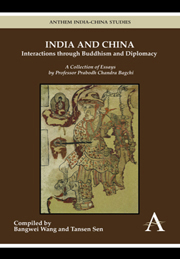 India and China: Interactions through Buddhism and Diplomacy
India and China: Interactions through Buddhism and Diplomacy Book contents
- Frontmatter
- Contents
- Compilers' Note
- Introduction (English and Chinese)
- Part One
- 1 Ancient Chinese Names of India
- 2 The Beginnings of Buddhism in China
- 3 Indian Influence on Chinese Thought
- 4 A Note on the Avadānaśataka and its Chinese Translation
- 5 Bodhisattva-śīla of Śubhākarasiṁha
- 6 A Fragment of the Kāśyapa Saṁhitā in Chinese
- 7 The Chinese Mysticism
- 8 Some Early Buddhist Missionaries of Persia in China
- 9 Some Letters of Hiuan-Tsang and his Indian Friends
- 10 New Lights on the Chinese Inscriptions of Bodhgayā
- 11 A Buddhist Monk of Nālandā amongst the Western Turks
- 12 Political Relations between Bengal and China in the Pathan Period
- 13 Chinese Coins from Tanjore
- 14 Report on a New Hoard of Chinese Coins
- 15 Ki-pin and Kashmir
- 16 Sino-Indian Relations – The Period of the United Empires (618–1100 A.D.)
- Part Two Short Articles
- Part Three Articles in Bengali
- Appendix
- Index
7 - The Chinese Mysticism
from Part One
Published online by Cambridge University Press: 05 March 2012
- Frontmatter
- Contents
- Compilers' Note
- Introduction (English and Chinese)
- Part One
- 1 Ancient Chinese Names of India
- 2 The Beginnings of Buddhism in China
- 3 Indian Influence on Chinese Thought
- 4 A Note on the Avadānaśataka and its Chinese Translation
- 5 Bodhisattva-śīla of Śubhākarasiṁha
- 6 A Fragment of the Kāśyapa Saṁhitā in Chinese
- 7 The Chinese Mysticism
- 8 Some Early Buddhist Missionaries of Persia in China
- 9 Some Letters of Hiuan-Tsang and his Indian Friends
- 10 New Lights on the Chinese Inscriptions of Bodhgayā
- 11 A Buddhist Monk of Nālandā amongst the Western Turks
- 12 Political Relations between Bengal and China in the Pathan Period
- 13 Chinese Coins from Tanjore
- 14 Report on a New Hoard of Chinese Coins
- 15 Ki-pin and Kashmir
- 16 Sino-Indian Relations – The Period of the United Empires (618–1100 A.D.)
- Part Two Short Articles
- Part Three Articles in Bengali
- Appendix
- Index
Summary
The Chinese mind, generally speaking, has no mystic bent. The Confucian positivism is its best expression and the greater bulk of the people have been ardent followers of the Confucian ethics. The abolition of imperialism, round which this Confucianism centered in ancient times, has made no difference in the country and the Confucian attitude of mind has not been disturbed in the least. The Confucian ethics is mainly based on conservative social dogmas. There is no place of divine revelation in it, and it insists on the reciprocal duties of the Emperor and his subjects, father and children, and the fellowcitizens. The respect of the subjects for the Emperor, and the respect of the children for their ancestors, constitute the real foundation of the Government and family. This is why it has been given the place of a national religion in Confucian ethics. In Confucian philosophy there is no place for a Creator God, and in fact Confucius himself refused more than once to be dragged into the speculation on the existence of a Godhead. He explains the mystery of the Universe by the formulation of two principles which he calls Yin and Yang. Yin is the female principle which is passive and Yang is the male principle which is active. These two in conjunction create the beings which populate the earth.
Such a simple positivist creed could not have given rise to mysticism, but still China witnessed very early the birth and growth of a very intricate mysticism.
- Type
- Chapter
- Information
- India and China: Interactions through Buddhism and DiplomacyA Collection of Essays by Professor Prabodh Chandra Bagchi, pp. 87 - 90Publisher: Anthem PressPrint publication year: 2011


